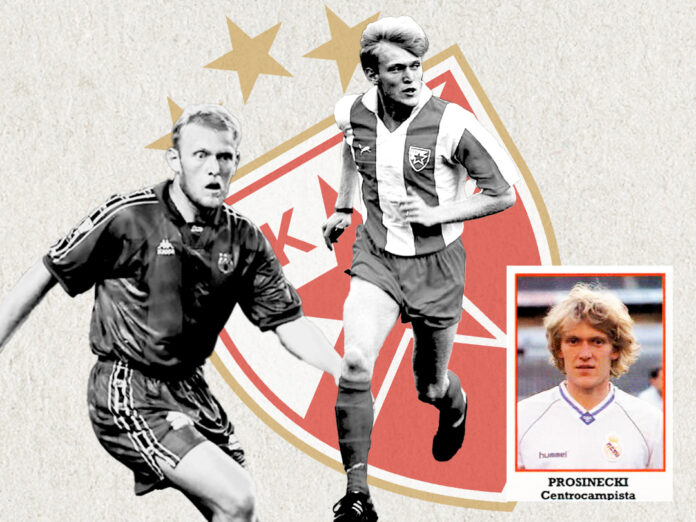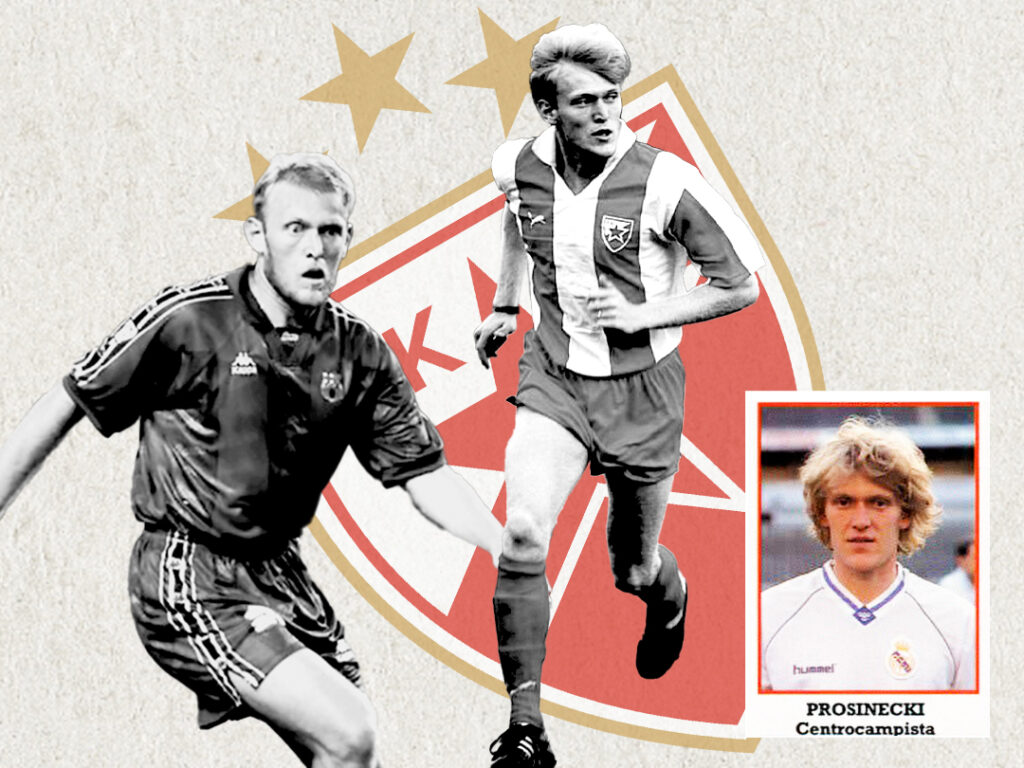
European Cup winner at 21, stints at Real Madrid & Barcelona, and a cult following at Portsmouth. The career of Robert Prosinečki was blessed with great highs and even greater lows. Injuries and sheer bad luck thwarted one of the 90’s greatest talents from fulfilling his true potential.
Yugoslavian league football during the late 80’s – early 90’s was the golden era for the region, the league was stacked with exceptional talent, many of which would go on to represent Europe’s elite clubs following the collapse of the Soviet Union.
Soviet rule would stop players moving abroad until late into their careers. These restrictions: common practice across Eastern Bloc countries at the time, saw multiple generational talents converge at Red Star Belgrade, creating one of Europe’s greatest and yet underappreciated sides.
A (red) Star is Born
Making a name for himself at Red Star during the ’87-’88 season was a young Robert Prosinečki. Arriving on a free transfer from Dinamo Zagreb the year prior, Prosinečki immediately stood out, running games from midfield with his slick and composed passing style. It would be that campaign’s mid-season FIFA Youth World Championship where the rest of Europe would begin to sit up and really take notice.
Brimming with talent and future greats, Yugoslavia would go on to beat West Germany in the final on penalties. The likes of Davor Šuker, Predrag Mijatović, and future A.C Milan legend Zvonimir Boban all starred, but it was Prosinečki who stole the limelight, winning the tournament’s Golden Ball and impressing scouts with his conductorial displays in the heart of midfield.
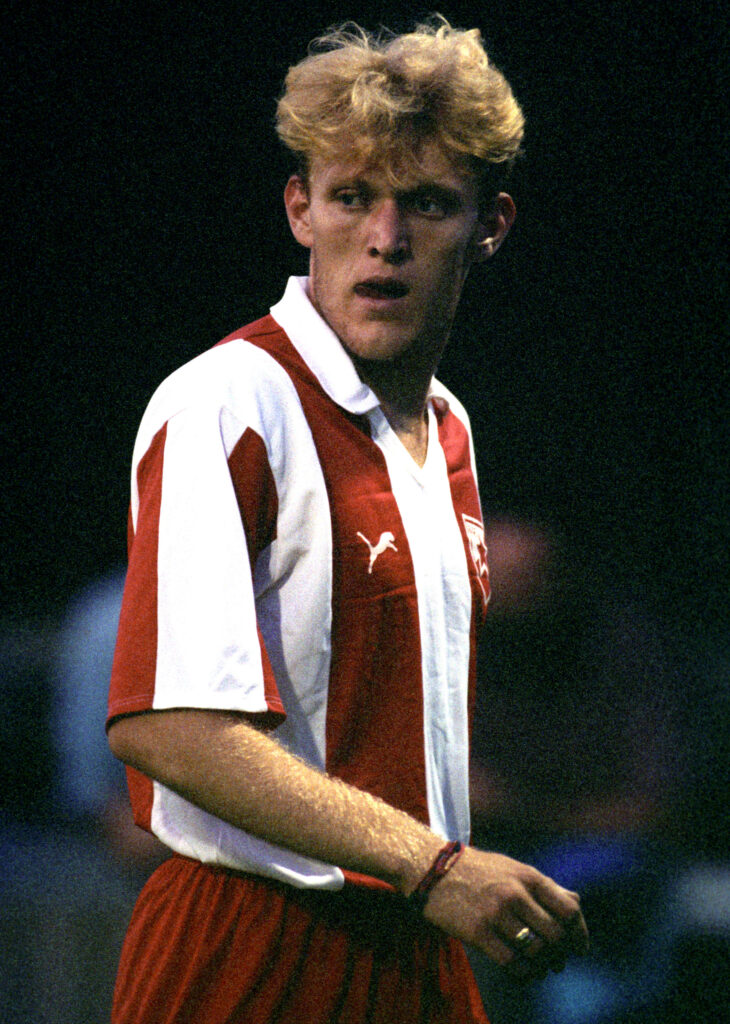
 Credit: Alarmy
Credit: AlarmySuch was his form, the ’97 youth World Cup would see Prosinečki become the first player to be banned from leaving the tournament by FIFA. Concerned by their second-round knockout tie against Club Brugge in the UEFA Cup, Red Star pushed for his return. The decision prompted his international team-mates to protest to FIFA official’s forcing then president João Havelange to step in. The intervention only added to the noise surrounding Prosinečki. Even at 19 years of age, his importance to club and country was absolute.
The following season would see Prosinečki’s game develop further. Playing alongside another future Milan hero in Dejan Savićević and goal machine Darko Pančev, Red Star would seal the 1990 league title at a canter. The summer transfer window that followed would see Red Star lay the foundations for their greatest of seasons.
Viewed as the final piece of the puzzle, legendary freekick specialist Siniša Mihajlović’s arrival completed Red Star’s starting XI. Their playing style, resembling that of the gegenpressing or counter pressing teams seen in today’s game, grew in confidence as the 1990-91 campaign progressed. Prosinečki: central to the team’s success, was seemingly on another level to opposition and teammates throughout. Such a form was not going unnoticed.
Red Star would pick up another league title that campaign, but the silver lining would be their famous European Cup victory. The unlikeliest of titles would be the only piece of European silverware in Red Star’s and indeed Serbian football history.
Concurring with the likes of Rangers and Bayern Munich in the knockout stages, with Prosi scoring a stunning freekick against the Scottish Champions. Red Star would meet Marseille in the final. The Galacticos of their time Marseille boasted the likes of Jean-Pierre Papin, Chris Waddle, Abedi Pele, Jean Tigana and former Red Star great Dragan Stojković in their lineup. On paper the final was the definition of men against boys.
Aware of the task at hand Red Star manager Ljupko Petrović would make the bold, albeit negative, decision to nullify Marseille and play for penalties. The tactical masterstroke, not easy on the eye for spectators, would all become clear once the structure of the Yugoslav First League is explained. With all games ending in draws going to penalties back home, the Red Star players (even at their tender age) were accustomed to the pressures of a penalty shootout. It was second nature.
The tactic invariably paid off, with Prosinečki scoring in their 5-3 penalties victory to make Red Star Belgrade European Champions. The achievement was astonishing given the backdrop of the turmoil unfolding in Yugoslavia. And as the Soviet Union fell later that year, sadly as did Red Star’s European Cup winning side. The region would be robbed of arguably one of the greatest counter-attacking teams the game has ever seen.
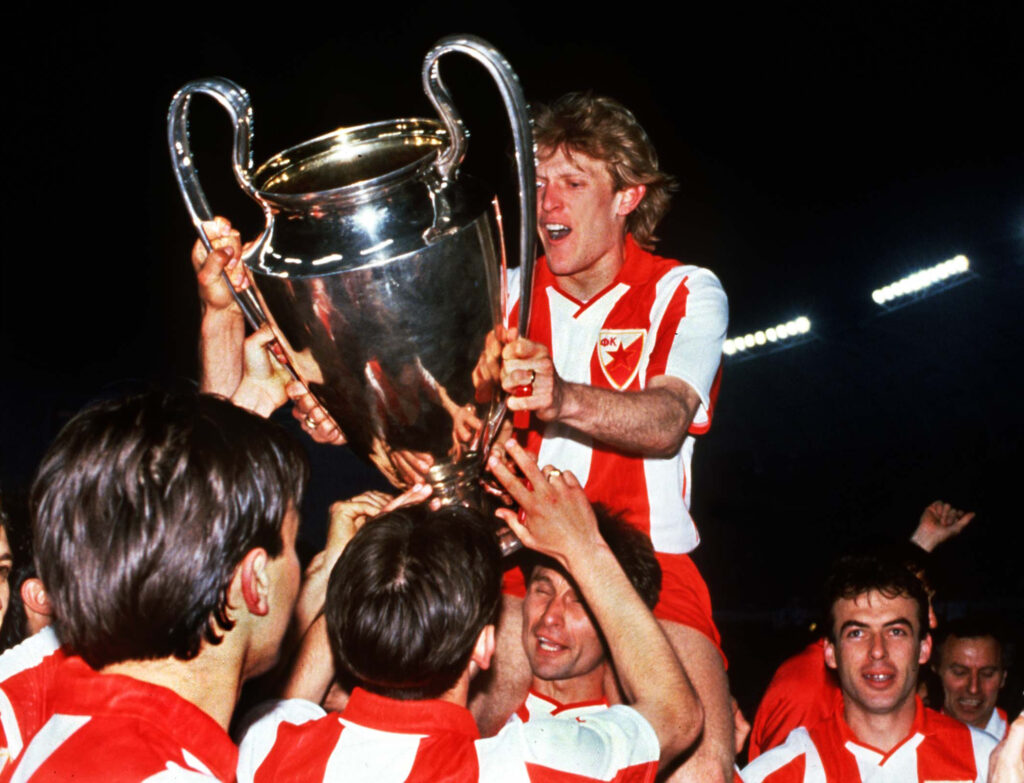
 Credit: Shutterstock
Credit: ShutterstockThe (failed) Galáctico
Real Madrid would win the race for Prosinečki’s much sought after signature in the summer of ’91. The €15 million deal was Los Blancos’ marquee signing following a season of discontent. Led by Serbian manager Radomir Antić, Madrid placed enormous faith in Prosinečki to re-establish order in La Liga and on the European stage.
The seemingly dream partnership of club and player would quickly turn sour with Prosinečki missing 6 months and managing only 3 league appearances in his debut campaign. Muscle injuries followed by continued fitness struggles would plight his season. A solitary trademark free kick goal in the El Clásico against Barcelona would give the Real Madrid fans only a brief glimpse into Prosi’s enormous ability.
The 1993-94 season approached with genuine optimism as Madrid announced a fully fit Prosinečki was set to fully make his mark at the Santiago Bernabéu. The hype again failed to translate to performances, with injuries starving Prosinečki of a consistent run of games. The lack of continuity was understandably affecting Robert’s confidence, whilst the demanding Real fans further compounded his lack of form. Injuries were robbing a young man of expressing his already proven talent.
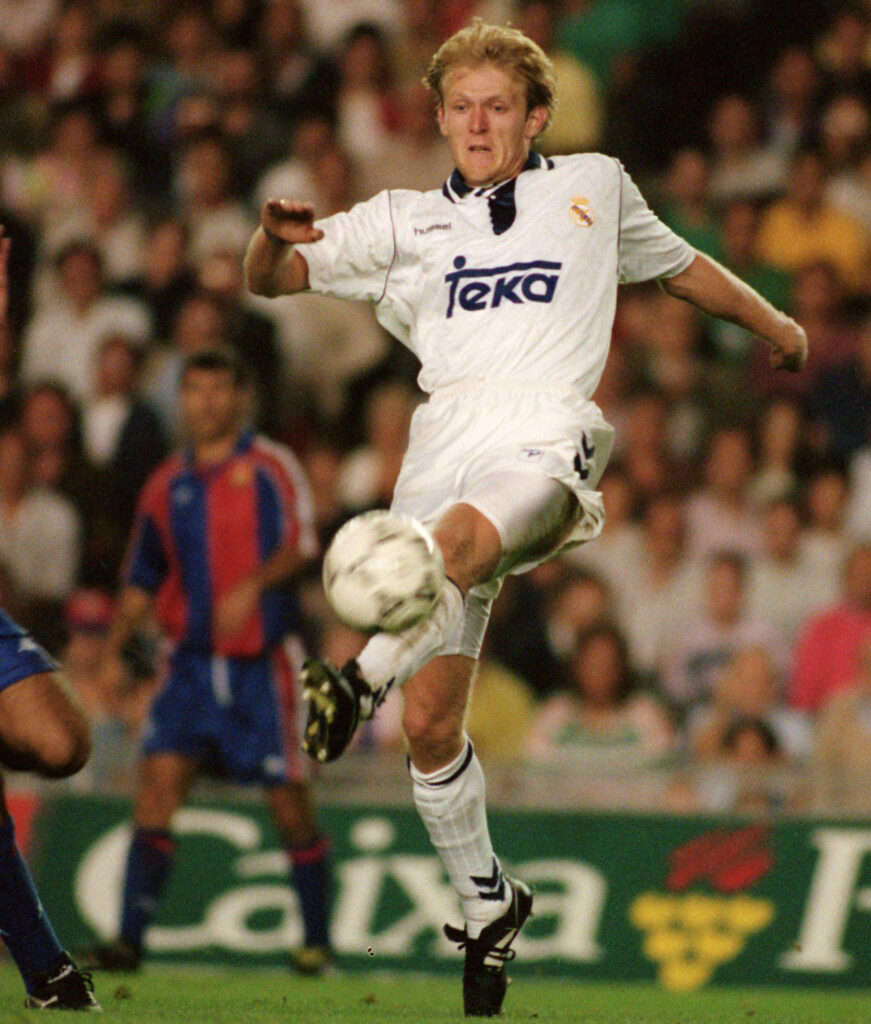
 Credit: Alarmy
Credit: AlarmyThe pattern continued in 1994 with Prosinečki managing only 23 appearances, Prosi’s persistent muscle injuries and physical frailty had now become too much for the Real fans and officials to ignore. Midway through the campaign, Chairman Ramón Mendoza choose to publicly criticise the Prosinečki signing, and deemed him surplus to requirements. With his hand publicly forced, Prosinečki would join minnows Real Oviedo on loan for the following season in a bid to regain his fitness, form, and reputation.
With the pressure off, confidence and some sustained fitness would find Prosinečki again. Reuniting with former coach Antić for one season at the Carlos Tartiere stadium would turn out to be a masterstroke, with Prosi finishing the season with his reputation fully restored. The midfielder would manage 30 appearances in his solitary season at Oviedo, the highlight being their 3-2 victory over Real Madrid. It was sweet redemption for the midfielder, who finally got to show the Madridistas what he could do. The hype surrounding Prosinečki had returned.
Crossing (el classico) Divide
Legendary Barcelona coach Johan Cruyff made his move for Prosinečki in the summer of 1995, making the midfielder only the fifth non-Spanish player to cross the bitter El Clásico divide.
Such was his form at Oviedo, Cruyff and the media agreed: Robert Prosinečki was the final piece of the jigsaw. He would finally fulfil the potential that had many comparing his ability to that of his new manager.
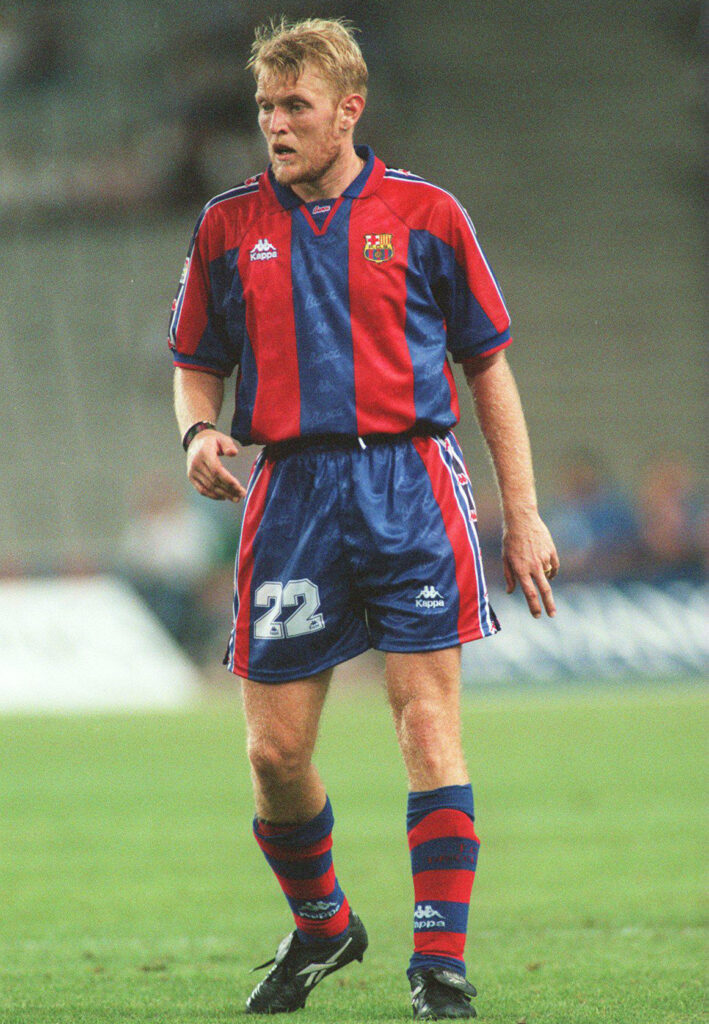
 Credit: Alarmy
Credit: AlarmySadly, history would again repeat itself for Prosinečki at the Nou Camp. Continued muscle injuries and fitness issues would see the midfielder manage only 50 appearances across two and half seasons, his stop start form would lead to Cruyff and subsequent manager Bobby Robson benching the midfield for less injury prone team-mates.
Seeing the writing on the wall, Prosinečki wanted out, and Barca agreed. In December 1996 Prosinečki signed for Seville in a €1.67 million deal. The move would be the start of multiple transfers across Europe in search of a fresh start, invariably fresh injuries wouldn’t be far behind him.
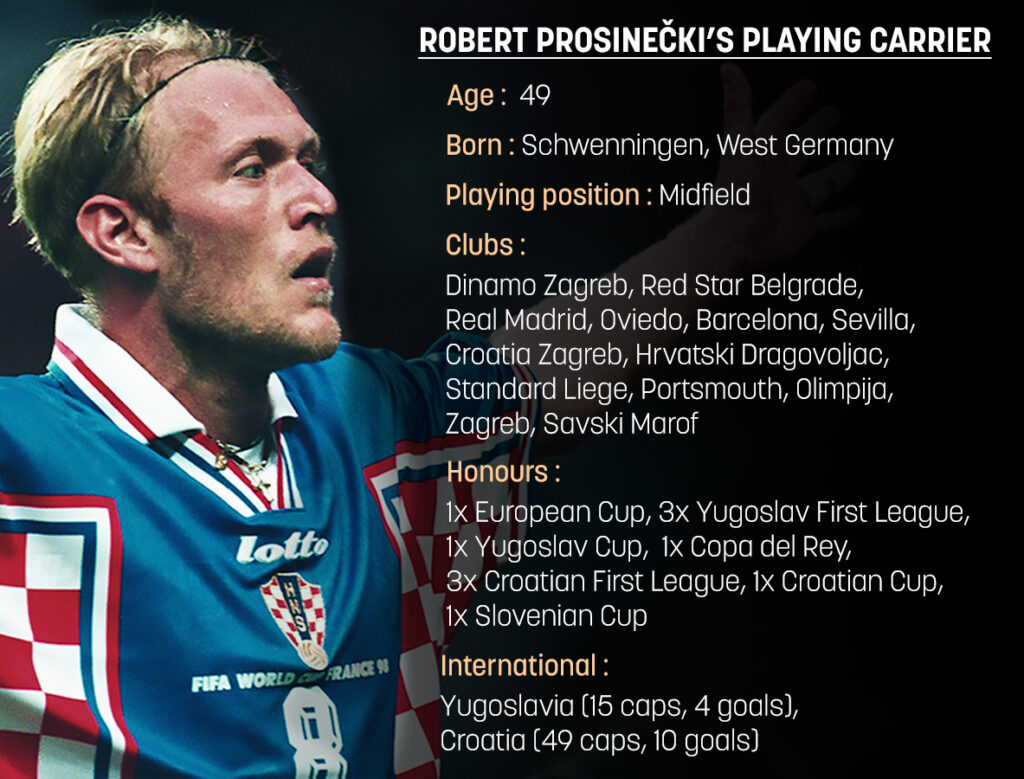
Reminding The World (again)
The France ’98 World Cup would again be a reminder of Robert Prosinečki’s undeniable talent. Playing alongside fellow stars Zvonimir Boban, Davor Šuker and Aljoša Asanović, Prosinečki’s virtuoso displays in central midfield would be the catalyst for Croatia’s remarkable run to the semi-finals.
Prosinečki immediately announced himself in France with a sublime freekick against Jamaica in the opening fixture. The well worked set play saw Prosinečki role the ball to Robert Jarni on the far-left side of the penalty box, the wing-back instantly stopped the ball, allowing Prosi to regain possession, who then sold of his opponent with a trademark dummy, before lobbing the Jamaica keeper Warren Barrett from an impossible angle.
Croatia’s exploits in the opening fixtures would remind the world of Prosinečki’s class, with standout performances against Japan and Romania sealing Croatia’s passage to the knockout phase.
A 3-0 victory against Germany in the quarterfinals would set up a semi-final tie with tournament favourites and hosts France. Unfortunately, the 2-1 loss to the eventual winners would bring an end to Croatia’s march to glory.
The third-place playoff would pit Croatia against Gus Hiddink’s Holland. Croatia would solidify their third-place finish with a 2-1 victory, goals from Prosinečki and Šuker either side of a Bolo Zenden strike bringing an end to Croatia’s impressive tournament showing. The Croat’s quickly became the world’s second favourite team, with Prosinečki and Šuker being the standout performers.
To Play Pompey (to wreak havoc)
Prosinečki would spend the subsequent years following the 1998 World Cup wandering the football wilderness, with spells in his native Croatia and then in Belgium with Standard Liège. Yet, one last adventure would come calling in 2001, with Portsmouth’s Serbian owner Milan Mandarić pulling out all the stops to bring the maverick midfielder to Division One in England.
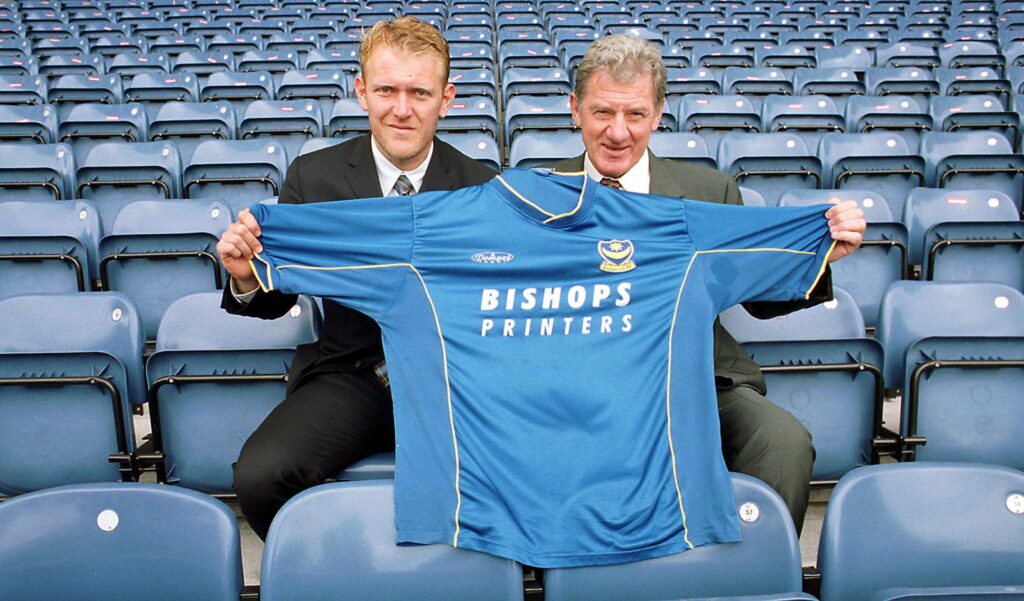
 Image: Alarmy
Image: AlarmyPortsmouth fans could hardly believe the news: an ex-Real Madrid and Barcelona midfielder strutting their stuff at Fratton Park. Club stores were swamped with fans acquiring replica shirts, it was welcome financial relief at least for Mandaric, the owner was paying Prosinečki over £15,000 a week. An obscene amount for a Division One payer at the time.
The investment instantly paid off, with Prosinečki announcing his arrival in Division One with a silky opening day display against Grimsby. Prosi would waltz around the Grimsby defence all afternoon, having a hand in all four goals as Pompey sealed an emphatic 4-2 victory.
Prosinečki early season form had the Portsmouth fans salivating, with standout performances following against Crystal Palace and Rotherham. The midfielder would score 9 goals in his solitary season at Portsmouth, the highlight coming against Barnsley with a trademark freekick completing his hat-trick.
Peter Crouch, just 20 years of age when Prosinečki arrived at Portsmouth, would benefit greatly from the midfielder’s pin-point deliveries, scoring 19 goals in the 2001-02 season.
He would wax lyrical about his team-mate’s ability, highlighting his famed dummy that left countless players in his wake.
“Robert fitted the word ‘maverick’ perfectly and the only time he wasn’t smoking a Marlboro Red was when he was on the pitch.“
“We would barely see him at training during the week but, my God, when he played for Portsmouth, he was unbelievable.“
“He had this trick where he would shape to shoot, feint and then roll his foot over the ball to leave the defender absolutely bamboozled.“
“You knew it was coming, you could see a mile off what he was going to do, but it was just impossible to stop.“
“He must have been some sight in his pomp, when he played for Red Star Belgrade and Real Madrid. He was a one-man band for Portsmouth, a joy to behold.” Peter Crouch told TalkSport.
Prosinečki would leave Portsmouth at the end of the season a club legend, with many still regarding the player as the greatest in their history. It was a fitting end towards the twilight of Prosi’s career, playing in front of adoring fans, those who cherished his brilliance and creativity.
A brief 45-minute cameo in the 2002 World Cup would follow Prosi’s exploits in England, and his retirement was then confirmed in 2005 after brief spells in Slovenia and back in Croatia. The curtain would fall on a career that often fell short of his generational talent. Injuries robbed us of surely countless more examples of genius.
Presenting both Real Madrid and Barcelona is surely testament to the quality of Robert Prosinečki, only the likes of Ronaldo Nazario, Luis Figo and Samuel Eto’o have done so since the midfielders retirement.
When commenting on his career at the two Spanish powerhouses, Prosinečki still holds nothing but positive memories despite the perceived failure.
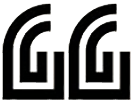
All players dream of playing for Real or Barça – I played for both of them! And I have wonderful memories of it all.
Above all, I feel as if I left the people there with good memories of me. I don’t think there are that many players who have worn both shirts and left good impressions at both clubs.
These days, when I see the welcome I get at both Madrid and Barcelona, it makes me think that my time at the clubs can’t have been completely wasted.
-Robert Prosinečki
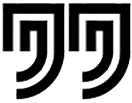
Indeed, ask any fan who remembers Robert Prosinečki, and a smile will not be too far away. A career that lacked the expected silverware but left behind truly timeless memories.
